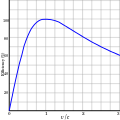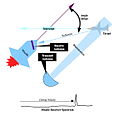Portal:Rocketry
The Rocketry Portal

A rocket (from Italian: rocchetto, lit. 'bobbin/spool') is a vehicle that uses jet propulsion to accelerate without using the surrounding air. A rocket engine produces thrust by reaction to exhaust expelled at high speed. Rocket engines work entirely from propellant carried within the vehicle; therefore a rocket can fly in the vacuum of space. Rockets work more efficiently in a vacuum and incur a loss of thrust due to the opposing pressure of the atmosphere.
Multistage rockets are capable of attaining escape velocity from Earth and therefore can achieve unlimited maximum altitude. Compared with airbreathing engines, rockets are lightweight and powerful and capable of generating large accelerations. To control their flight, rockets rely on momentum, airfoils, auxiliary reaction engines, gimballed thrust, momentum wheels, deflection of the exhaust stream, propellant flow, spin, or gravity.
Rockets for military and recreational uses date back to at least 13th-century China. Significant scientific, interplanetary and industrial use did not occur until the 20th century, when rocketry was the enabling technology for the Space Age, including setting foot on the Moon. Rockets are now used for fireworks, missiles and other weaponry, ejection seats, launch vehicles for artificial satellites, human spaceflight, and space exploration.
Chemical rockets are the most common type of high power rocket, typically creating a high speed exhaust by the combustion of fuel with an oxidizer. The stored propellant can be a simple pressurized gas or a single liquid fuel that disassociates in the presence of a catalyst (monopropellant), two liquids that spontaneously react on contact (hypergolic propellants), two liquids that must be ignited to react (like kerosene (RP1) and liquid oxygen, used in most liquid-propellant rockets), a solid combination of fuel with oxidizer (solid fuel), or solid fuel with liquid or gaseous oxidizer (hybrid propellant system). Chemical rockets store a large amount of energy in an easily released form, and can be very dangerous. However, careful design, testing, construction and use minimizes risks. (Full article...)
Selected article -

Falcon 9 is a partially reusable medium-lift launch vehicle that can carry cargo and crew into Earth orbit, designed, manufactured and launched by American aerospace company SpaceX. It can also be used as an expendable heavy-lift launch vehicle. The first Falcon 9 launch was on 4 June 2010. The first Falcon 9 commercial resupply mission to the International Space Station (ISS) launched on 8 October 2012. In 2020 it became the first commercial rocket to launch humans to orbit and remains the only such vehicle. It is the only U.S. rocket certified for transporting humans to the ISS. In 2022, it became the U.S. rocket with the most launches in history and with the best safety record, having suffered just one flight failure.
The rocket has two stages. The first (booster) stage carries the second stage and payload to a pre-determined speed and altitude, after which the second stage accelerates the payload to its target orbit. The booster is capable of landing vertically to facilitate reuse. This feat was first achieved on flight 20 in December 2015. As of 18 April 2024, SpaceX has successfully landed Falcon 9 boosters 284 times. Individual boosters have flown as many as 20 flights. Both stages are powered by SpaceX Merlin engines, using cryogenic liquid oxygen and rocket-grade kerosene (RP-1) as propellants. (Full article...)In the news
No recent news
Topics
List articles
Things to do
 |
Here are some tasks awaiting attention:
|
Wikimedia
The following Wikimedia Foundation sister projects provide more on this subject:
-
Commons
Free media repository -
Wikibooks
Free textbooks and manuals -
Wikidata
Free knowledge base -
Wikinews
Free-content news -
Wikiquote
Collection of quotations -
Wikisource
Free-content library -
Wikispecies
Directory of species -
Wikiversity
Free learning tools -
Wikivoyage
Free travel guide -
Wiktionary
Dictionary and thesaurus



















































